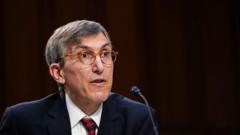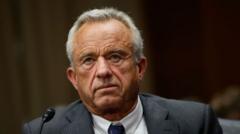With plans to challenge the food industry and enhance dietary regulations, RFK Jr. aims to make significant changes to American food standards, focusing on reducing ultra-processed foods and harmful additives. However, his controversial past raises questions about his approach and feasibility of enacting such reforms.
RFK Jr.'s Ambitious Agenda: Aiming to Transform American Dietary Standards

RFK Jr.'s Ambitious Agenda: Aiming to Transform American Dietary Standards
Robert F. Kennedy Jr. pledges to reform how Americans eat, targeting ultra-processed foods, additives, and nutritional guidelines as he prepares to lead the Department of Health and Human Services.
Robert F. Kennedy Jr. has set a bold agenda to reshape American dietary practices with a keen focus on eliminating ultra-processed foods and harmful additives. As a nominee for the Department of Health and Human Services under President-elect Donald Trump, Kennedy's vision aligns with his campaign slogan "Make America Healthy Again." He has expressed grave concerns over the food industry’s impact on children’s health, stating, “We are betraying our children by letting [food] industries poison them.”
Despite his controversial track record, which includes unsubstantiated claims linking vaccines to autism, Kennedy's proposals have garnered some bipartisan support. Concerns regarding the safety and nutritional quality of school lunches, reconstructed through his lens, have drawn attention from officials like Colorado's Democratic Governor Jared Polis, who expressed a cautious endorsement of Kennedy’s reformist stance.
Kennedy aims to target ultra-processed foods, which encompass a range of products high in sugars, salts, and unhealthy fats. His insistence on regulating ingredients such as food dyes and seed oils reflects a broader goal of tackling chronic health issues linked to unhealthy diets. However, he may face significant opposition from the very food industry he aims to reform. Regulatory challenges complicate the FDA's authority over what constitutes ultra-processed foods, highlighting the complex interplay between various government agencies in food regulation.
While the former environmental lawyer seeks to implement sweeping changes, health experts question the feasibility of his ambitious plans. The FDA, which employs over 18,000 individuals, has faced scrutiny for its perceived inadequacies but changing its core operational dynamics, as Kennedy suggests, could face extensive pushback, both legislative and industrial.
Kennedy's stance on controversial subjects, including banning fluoride in drinking water and advocating for raw milk consumption, further underscores the contentious nature of his health policies. Critics highlight the lack of nutritional benefits from non-pasteurized milk and the scientifically supported dental benefits of fluoride, putting his proposals into question.
The pathway to reforming US dietary practices may lie within existing frameworks, as experts suggest that modifying US Dietary Guidelines could amplify the impact on public health. Nonetheless, Kennedy’s demeanor could threaten core expertise within the FDA, making it crucial for him to balance his bold ambitions with practical governance.
Ultimately, RFK Jr.'s approach promises to spark vital conversations about food safety and public health, but the real challenge manifests in navigating the intricate landscape of food politics while establishing a scientifically sound health policy for future generations. The potential for real change exists, but critics caution that his unorthodox views could hinder progress as much as they might spur it.




















